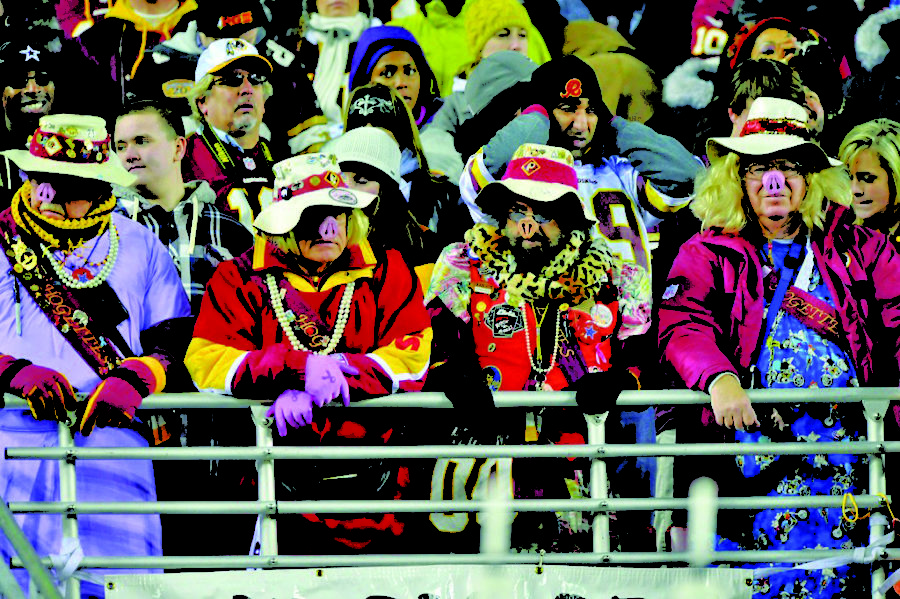Why We Love Sports: Fans are All-in for the Big Wins and the Heartbreaking Defeats
February 25, 2019
The pageantry. The ultimate pinnacle of accomplishment. The heartbreak. All of these are associated with one thing: sports fandom. If you are a true sports fan you know the thrill of victory and the pain that comes with defeat. You have felt the rush of excitement and wave of despair that comes with being a fan. But, why do we do it to ourselves?
San Antonio Spurs head coach Gregg Popovich may have answered this question when he said, “Why do we do it? We’re sick puppies.”
Well put, Coach Pop. We truly are sick puppies. We invest our time and effort to analyze, predict, and watch our favorite teams and then repeat the cycle like it’s our morning routine. We attach ourselves to complete strangers all in the hope that they will put a ball over a goal line, into a basket, or bring in the winning run.
In 2016, Washington Post writer Christine Emba wrote about the sheer volume of fans who are immersed in the art of sports.
“At least 40 percent of children in the United States play a team sport on a regular basis. Past that age (18)— and even for those who have never played a sport themselves — simply watching college-level, professional and international sports can become a critical part of life. Almost 112 million people watched Super Bowl 50 this February, and it’s predicted that 480,000 tourists will flood Rio for this summer’s Olympics. The sports market in North America alone was worth more than $60 billion in 2014 and is expected to reach $73 billion by 2019.”
According to Emba’s numbers, the business of sports is boomin’. But why? There just happens to be a science behind it. Shirley Wang of The Association for Psychological Science wrote about the science behind sports fandom back in 2006. In Wang’s piece she reported on Edward Hirt, a professor of Psychological and Brain Sciences at Indiana University- Bloomington, and his comments on how we cling onto sports teams.
“People are tying up a lot of who they are in their identity as fan of X-team.” Hirt continues, “A huge part of who they are, where they derive a lot of their positive and negative affect, is from what their team is doing.”
Our brains also establish a connection between the success of our favorite teams and the feeling one would normally link to personal success. Daniel Wann, a professor of psychology at Murray State University, explains in Wang’s piece that the connection fans feel for their teams “is the extent to which a fan feels a psychological connection to a team and the team’s performances are viewed as self-relevant.”
While I was writing and doing research on this, the biggest sporting event in North America was on the horizon. Super Bowl 53 was mere days away. The Super Bowl, a 4 hour event, would have hundreds of millions of viewers on the edge of their seats on the sheer principle that whichever team came out on top would be recognized as the supreme victor, while the other team – and its fans – brought back down to the reality that they came up just short. This year’s contest featured the 5-time champion New England Patriots taking on the new kids on the block, the Los Angeles Rams.
Like the many analysts and pundits who were on an assortment of sports programming this week, my classmates and I discussed the many storylines behind the big game. One of those classmates was junior Matthew Kiras. Matt, Matthew, or Kiras, as he is called is a die hard Patriots fan. While we were discussing how the Rams defense must bring interior pressure on Tom Brady like we were Chris Berman and Tom Jackson on NFL Primetime, I noticed Matt’s hair was getting a little too long. I asked him if he was planning a haircut in the near future. His response: “Not until after Sunday.”
Pressed on the issue, Matt noted that he had an overall better vibe for his Pats’ chances if he did not cut his hair.
It sounds completely foolish, but I get it – and so do millions of others. The way you sit when you watch a game matters. How you place your remote on the table matters (I’ll admit I do that one from time to time). And, in Matt’s case, even the length of your hair matters. Of course, none of it actually makes a difference to the players who actually affect the outcome of the game, but it doesn’t hurt to try. As Michael Scott once said, “I’m not superstitious, but I am little ‘stitious.”
We really are sick puppies, and it’s the best.













































